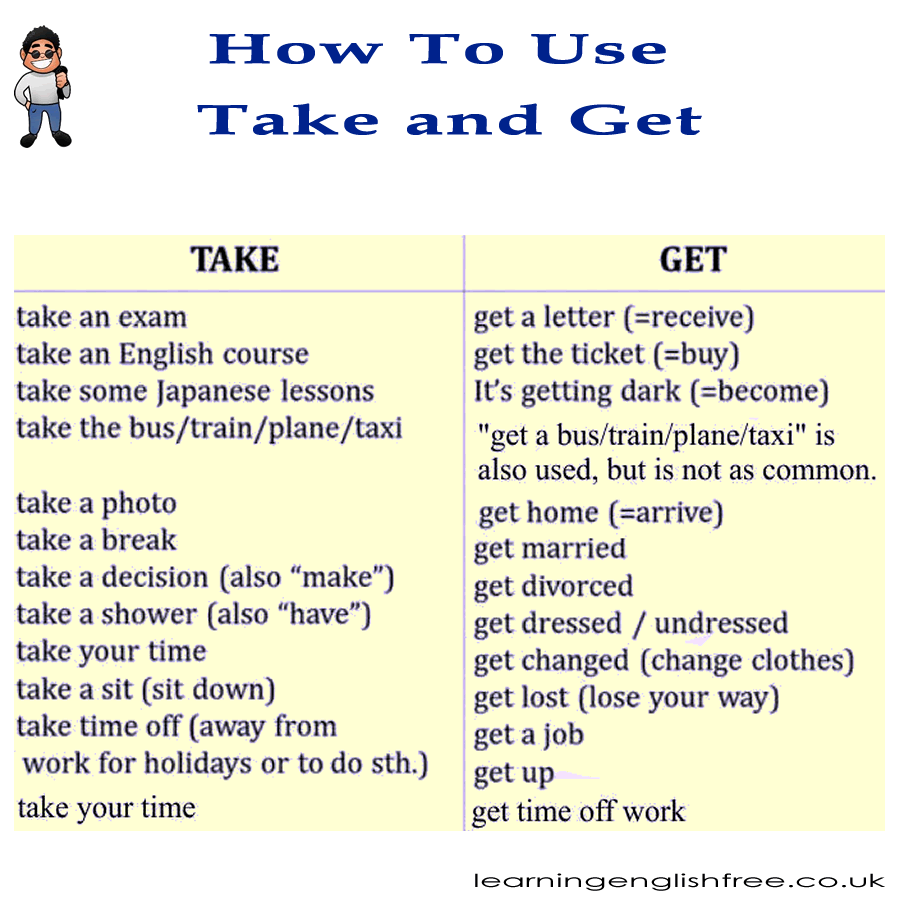Mastering 'Take' and 'Get' in English
Understanding how to use the verbs 'take' and 'get' correctly is essential for English learners. These verbs are used frequently in various contexts, each with multiple meanings and uses. This lesson will explore the different ways 'take' and 'get' are used in English, providing clear examples to illustrate their meanings. You'll learn about 'take' in contexts like taking an exam or a shower and 'get' in scenarios such as getting a letter or getting married. Tips on remembering their usage will be provided, helping you to use these verbs accurately in your conversations. Exploring these verbs enriches your vocabulary and aids in more nuanced English communication. For more lessons on English usage and grammar, visit learningenglishfree.co.uk, and don’t forget to share these helpful resources with your family and friends on Facebook.

Using 'Take' in English
- Take an exam: To participate in an examination.
- "Are you ready to take the exam tomorrow?"
- Take an English course: To enrol in and attend a course.
- "She decided to take an English course to improve her skills."
- Take some Japanese lessons: To receive instruction in Japanese.
- "I want to take some Japanese lessons before my trip."
- Take the bus/train/plane/taxi: To use these modes of transportation.
- "We will take the train to get there."
- Take a photo: To capture an image using a camera.
- "Let’s take a photo in front of the monument."
- Take a break: To pause for rest.
- "You’ve been working hard; take a break."
- Take a decision / Make a decision: To decide.
- "I need to take a decision on this matter soon."
- Take a shower / Have a shower: To bathe oneself.
- "I usually take a shower in the morning."
- Take your time: To do something without rushing.
- "Take your time to answer the question."
- Take a seat (sit down): To be seated.
- "Please, take a seat while you wait."
- Take time off (away from work): To have a break from work.
- "She’s going to take time off next week."
Using 'Get' in English
- Get a letter (receive): To receive a letter.
- "Did you get the letter I sent?"
- Get the ticket (buy): To purchase a ticket.
- "I need to get the tickets for the concert."
- Get dark (become): To become dark.
- "It’s getting dark; we should head home."
- Get home (arrive): To arrive at home.
- "What time did you get home last night?"
- Get married: To enter into marriage.
- "They are going to get married next month."
- Get divorced: To legally end a marriage.
- "They decided to get divorced after ten years."
- Get dressed/undressed: To put on/take off clothes.
- "I need to get dressed for the party."
- Get changed (change clothes): To change one's outfit.
- "I’ll get changed before we go out."
- Get lost (lose your way): To become disoriented or unable to find one's way.
- "We got lost on our way to the hotel."
- Get a job: To gain employment.
- "She was so happy to get a job in her field."
- Get up: To rise from bed.
- "I find it hard to get up early in the morning."
- Get time off work: To be permitted to take a break from work.
- "Did you manage to get time off work for the trip?"
Enhancing Communication with 'Take' and 'Get'
Completing this lesson will greatly improve your understanding and usage of 'take' and 'get' in various contexts. These verbs are fundamental in English; learning their different applications will enhance your communication skills. To practice, try using these verbs in sentences relevant to your daily life, and pay attention to how they are used in conversations and written texts. For more enriching English lessons and practical tips, connect with our learning community at www.facebook.com/learningenglishfree.co.uk.
